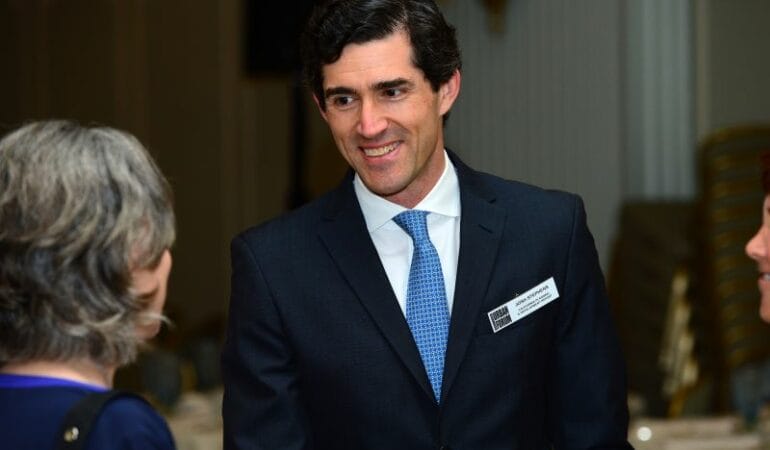
Land Matters Podcast: Staying Calm and Planning On
There’s so much happening today in the world’s cities—from climate change to a massive shortage of affordable housing—that the job of the city planner has become a furiously busy one, requiring a singular talent for multitasking and managing the needs of increasingly divided constituencies.
Planners have traditionally labored largely behind the scenes, but are emerging into a more visible role as they explain their work and try to keep the peace, said author Josh Stephens on the latest episode of the Land Matters podcast. Stephens interviewed 23 big-city planners for a new book, Planners Across America.
“Planning directors have huge influence over these cities . . . but they’re not necessarily well known. They are not on the level of a mayor or a city council person who are obviously elected officials, and by definition in the public spotlight; they’re not necessarily like a police chief who is always doing press conferences,” he said. “I think one thing that is very clear in these interviews is how earnest planning directors are about mediating, about figuring out what different stakeholders need and want, and are willing to tolerate.”
Acknowledging the distrust that has grown particularly in communities of color, over urban renewal, highways through urban neighborhoods, and exclusionary zoning, Stephens said planners realize the importance of “listening to people, especially people who have historically been left out of the planning conversation.”
At the same time, planners must confront established residents fighting growth, in what is presented as a virtuous grassroots rebellion but is actually the manifestation of NIMBYism, standing for “not in my backyard.”
“Many communities are empowered, and some of that power is unevenly distributed to the extent that some communities have louder voices, and some communities will invoke people like Jane Jacobs in ways that are not necessarily beneficial for the city as a whole, or might even be disingenuous,” Stephens said.
As he spoke with planners, Stephens found widespread acceptance of the idea that most cities need a massive infusion of new housing supply including multifamily housing—and even high-end housing—to help bring prices down as a matter of basic economics. That’s been the aim of several statewide mandates requiring local governments to modify zoning.
“We do need to add luxury housing in high-cost places to accommodate the people who can afford it. I think ideally, that frees up space, and frees up capital and opportunity, and sometimes public funds to then also build deed-restricted affordable housing, and hopefully maintain a supply of naturally occurring affordable housing,” he said.
“You look at where the prices are highest, and that’s where you need to add housing. You need to add it at every level. There’s an argument that there’s no such thing as trickle-down housing. I don’t buy that. I live in Los Angeles, and there’s more than enough money to go around. If you don’t build luxury housing, that doesn’t mean that wealthy and high-income people are not going to move to LA. They’re simply going to move into whatever the next best housing is. That pushes people down, and eventually some people are left with no place to live.”
However, he said, there will be more post-pandemic movement, from hot-market cities to legacy cities, for example, suggesting the contours of a national housing market. “People have moved from LA to Phoenix, from San Francisco to Boise or Reno or Vegas, and there are other equivalents around the country. I think it’s going to be really interesting in the next decade to see how this filters out,” he said.
Josh Stephens is contributing editor of the California Planning & Development Report and previously edited The Planning Report and the Metro Investment Report, monthly publications covering, respectively, land use and infrastructure in Southern California. Planners Across America was published by Planetizen Press in 2022.
City and regional planning has been a major focus of the Lincoln Institute for many decades, from the annual gathering of 30-plus professionals in the Big City Planning Directors Institute, held in partnership with the American Planning Association and the Graduate School of Design at Harvard University, to the more recent promotion of exploratory scenario planning.
You can listen to the show and subscribe to Land Matters on Apple Podcasts, Google Podcasts, Spotify, Stitcher, or wherever you listen to podcasts.
Further Reading
Five Ways Urban Planners Are Addressing a Legacy of Inequity (Land Lines)
Seven Need-to-Know Trends for Planners in 2023 (Land Lines/APA)
A Day in the Life of the City Planner (Princeton Review)
Anthony Flint is a senior fellow at the Lincoln Institute of Land Policy, host of the Land Matters podcast, and a contributing editor of Land Lines.
Lead image: Josh Stephens. Credit: Rich Schmitt Photography/Westside Urban Forum.
